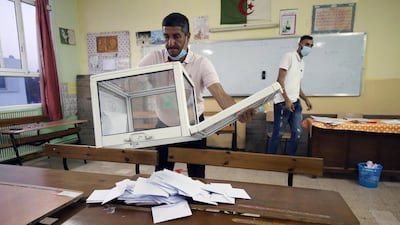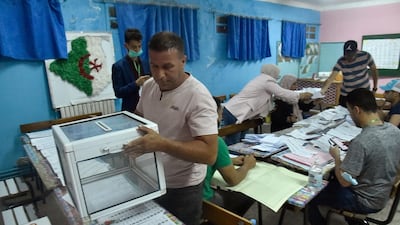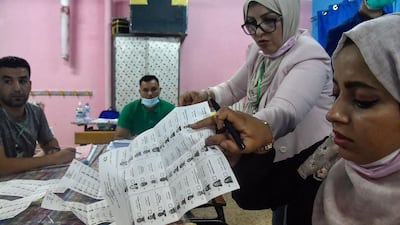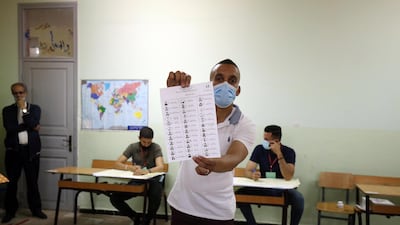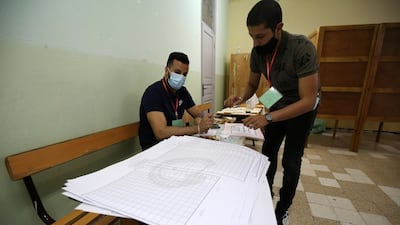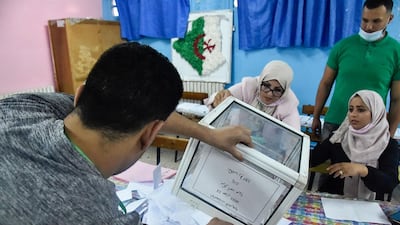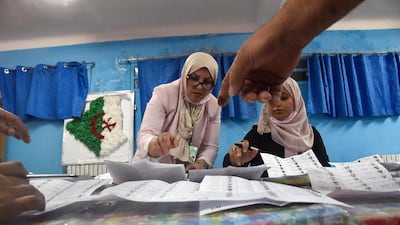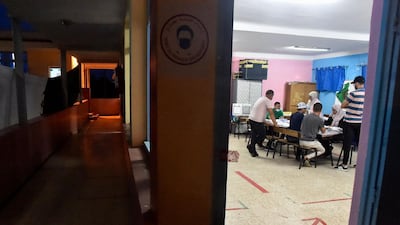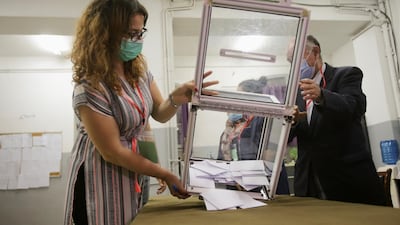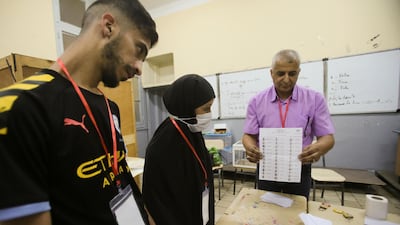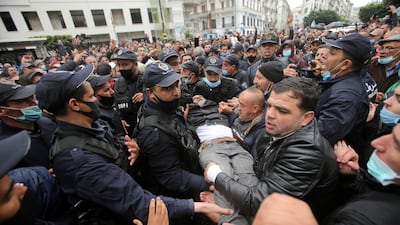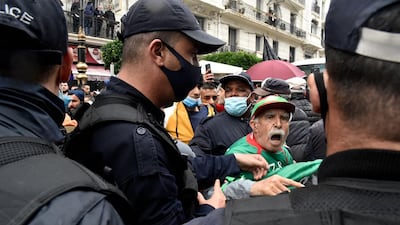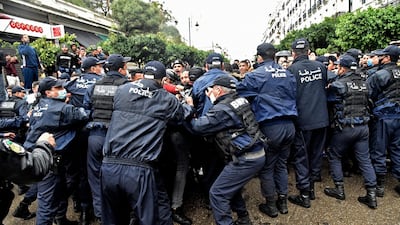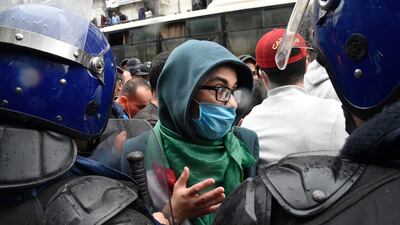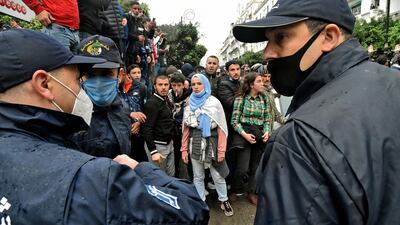Algerian voters stayed home in record numbers during Saturday's legislative elections, following calls from opposition groups to boycott the vote.
According to election authorities, only a third of Algerians came out to vote, with Mohamed Charfi, president of the Autorité Nationale Indépendante des Elections (ANIE) confirming the final turnout as 30.2 per cent.
While Mr Charfi claimed the election had taken place in “good conditions”, the vote was accompanied by clashes between protesters and security forces in the opposition stronghold of Kabylie, where some polling stations were forced to close early.
Overall, 24 million Algerians were invited to choose from the 13,000 candidates for 407 seats on offer. That two-thirds of voters abstained will be a further setback for President Abdelmadjid Tebboune’s programme of managed reform. His opponents contend those reform efforts are superficial.
More than half the candidates claimed to be independents. However, with fresh rules and government grants available for new candidates under the age of 40, observers have questioned just how independent many of those candidates are.
This is the third national poll Mr Tebboune has urged Algerians to take part in since mass protests, or the Hirak, forced his predecessor, the ailing octogenarian Abdelaziz Bouteflika, from office in April 2019.
None of the votes, including Mr Tebboune's own election in December 2019 and a referendum on a constitutional amendment in November last year, have drawn the level of participation the government has been hoping to achieve.
Yesterday's low numbers are unlikely to help matters.
Pointing to the final tally being the amalgamation of areas where the government had great support with those where participation was negligible, activist Aldja Samia Seghir was dismissive of whatever legitimacy the numbers granted the new parliament, saying "it is not the confidence of the Algerians that they want to win back, its a new political clientele."
Casting his vote in the capital on Saturday, the president was dismissive of the low turnout, telling reporters, "For me, it’s not the turnout percentage that’s important, it’s whether the legislators that the people elect have sufficient legitimacy.”
For many, his comment highlighted a government more concerned with superficial change over substantial reform.
"How can he say that?" Raouf Farrah of the Algerian civil society movement, Ibtykar asked.
"It's as if he doesn't understand how democracy works. This is about popular sovereignty. If you don't care about what the majority has to say, what do you care about as a Chief of State?"
Mr Farrah also questioned the extension of polling times, which saw stations stay open an hour beyond the 7pm cut off. In particular, Mr Farrah focused upon the anomalous surge in participation rates during the final period, where voter numbers almost doubled.
"It's also fair to question the results, especially from the South," Mr Farrah said, referring to the higher participation rates recorded in the further reaches of the near 920,000 square mile country, an area where Mr Farrah has travelled.
"Talking to people there, they see this elections only as a way of transmitting local grievances to the centre. It doesn't really have much to do with the independence of the process or the government in charge," he said.
"There's no way this government can claim legitimacy," Mr Farrah said, to do so would require to "engage fully into a new political agenda which starts by freeing the detainees and embarking upon a real transition to a new power. I don't believe this regime is really of that mindset," he said, "Everything we've seen so far suggests they're going to continue with their authoritarian rule."
The neglected south
"It's also fair to question the results from the south," Mr Farrah said, referring to the higher participation rates recorded in the farther reaches of the country, an area where he has travelled.
"Talking to people there, they see the vote as a way of transmitting local grievances to the centre. It doesn't really have much to do with the process or the government in charge," he said.
"There's no way this government can claim legitimacy," Mr Farrah said. To do so would require it to "engage fully with civil society, free the detainees and embark upon a managed transition to a new power".
"I don't believe this regime is really of that mindset," he said. "Everything we've seen so far suggests they're going to continue with their authoritarian rule."
Worsening crackdowns
The authoritarian approach has come to the fore since the Hirak re-emerged in February from its months-long hiatus due to the coronavirus pandemic.
The government responded with an escalating wave of repression as it seeks to wrest the impetus from the protesters who, in addition to ousting his predecessor, forced at least a partial reckoning with many of the country's old guard, many of whom were ultimately jailed on corruption charges.
In a move slammed by rights groups, seven of the Hirak's leaders were arrested on Thursday, with three being released just hours before the polls opened.
Writing shortly after his release, prominent freelance journalist, Khaled Drareni wrote of his "thirty Kafkaesque hours in Antar'" a barracks widely associated with human rights abuses. While confirming that he had not been maltreated, he continued, "our country deserves better than that and our intelligence services deserve better than this hijacking of their mission”.
By some estimates, upward of 3,000 activists have been detained by the security services since February.
Adding to the government's woes is an economy that relies almost exclusively on energy exports, a market that has remained depressed since prices crashed in 2014. Exacerbating its predicament is a predominantly young population, married to one of the most generous subsidy packages within Opec. For many analysts, Algiers has long run past the point where foreign reserves can defer the economic collapse that may be coming sooner rather than later.
